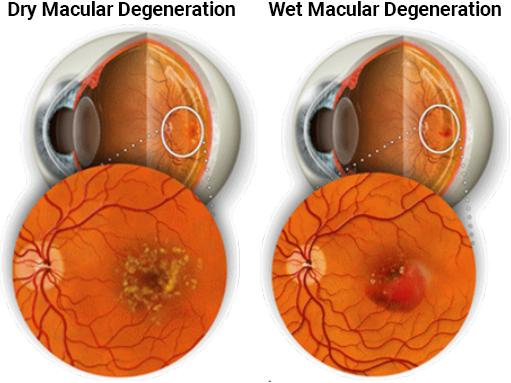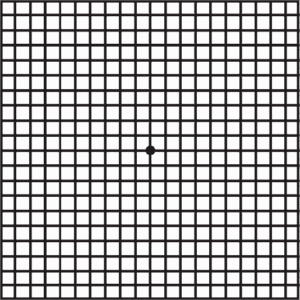Macular Degeneration (AMD)
Dry AMD Treatments
There is currently no treatment for dry AMD, but you can take steps to slow the progression of dry AMD, including:
- Daily eye vitamin intake (called AREDS Eye Vitamins)
- Wearing sunglasses with 100% UV protection
- Eating a Mediterranean diet
- Daily intake of green leafy vegetables
- Daily exercise
Studies funded by the National Institutes of Health indicate patients with intermediate and advanced dry AMD can reduce their risk of vision loss by at least 25% by maintaining high levels of antioxidants and zinc. Studies also suggest supplements do not provide significant benefit to patients with minimal or early dry AMD. Nutritional supplements do not prevent the initial onset of AMD or improve vision already lost to AMD.
Wet AMD Treatments
There have been some exciting advancements in the treatment of wet AMD. The most effective has been intravitreal anti-VEGF injections, which are repeated regularly. These injections reduce macular leakage and abnormal vascular growth, which helps to slow vision loss. In about 50% of patients, this treatment even improves vision.
The drugs currently used are:
- Avastin
- Lucentis
- Eylea
Another option is laser treatment. This can help seal the leaky vessels, but it cannot repair the damage that has already occurred.
Why Choose Us?
Take the next step in macular degeneration care with Visionary Eye Doctors. We understand the physical and emotional hardships that can accompany an AMD diagnosis and are here for you every step of the way. Our goal is to protect your vision as much as possible while helping you regain your quality of life.
Count on our board-certified macular degeneration experts to:
- Diagnose macular degeneration
- Explain your treatment options
- Provide information on living with macular degeneration
Learn more about macular degeneration and treatment options from Visionary Eye Doctors by calling our office today at (301) 591-1763. You can also schedule an appointment online.
Technology
Our surgeons are familiar with all the treatment options available today — from the latest advancement in femtosecond lasers and the latest in premium IOLs. This innovative technology is revolutionizing specialized eye surgery and our patients’ ability to see better than ever.
Surgeon Expertise
Our board-certified surgeons are highly experienced and highly skilled, and they have refined techniques paired with the highest level of patient care.
Results Matter
Our surgeons are committed to delivering exceptional outcomes and helping each patient achieve their desired visual goals. Our surgeons improve your full range of vision with the goal to minimize and hopefully eliminate dependence on glasses with our premium lens options.
Integrated Surgery for Complicated Vision Cases
Often, our macular degeneration patients may have other vision or medical issues, such as astigmatism, glaucoma, diabetes, or previous surgeries. No worries — our surgeons with their vast experience, expertise, and specialized training provide our patients the confidence of knowing their complex conditions are carefully evaluated prior to any procedure.
Thinking You May Need Macular Degeneration Treatment in Washington, DC or the Surrounding Areas?
Take the next step. Our goal is to improve your full range of vision, regain your quality of life, and minimize or eliminate your dependence on glasses. Call us today or request to schedule a macular degeneration consultation.
Request a Macular Degeneration Consultation
The first step in determining your candidacy for any procedure is to schedule a consultation and experience our comprehensive eye exam. This is the most complete eye exam available today and includes a consultation with one of our experienced surgeons. Utilizing advanced diagnostic technology, our surgeons will not only evaluate your candidacy for a procedure for but will look at the overall health of your eyes and establish a long-term plan for your best vision.
Please help us provide you with the best experience by answering a few quick questions, and one of our surgical counselors will assist you. If you are a current patient and/or have a medical concern or question, please contact us directly at (301) 591-1763.


